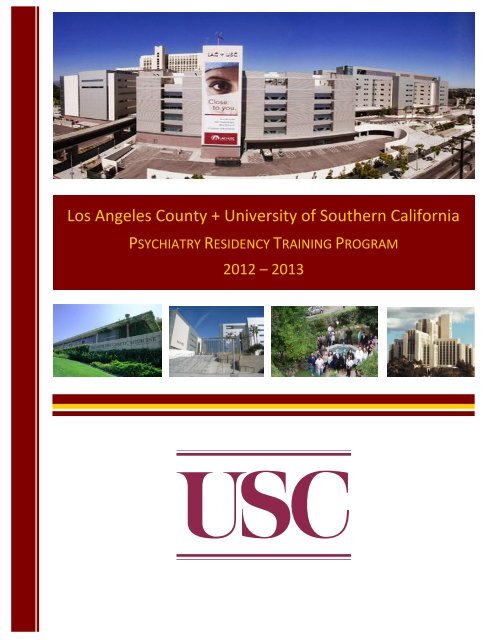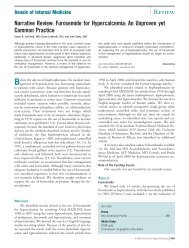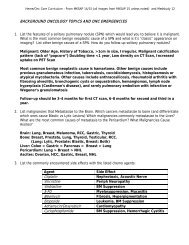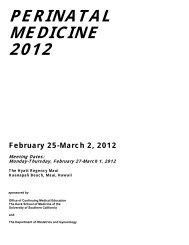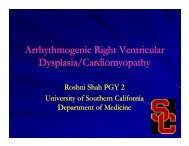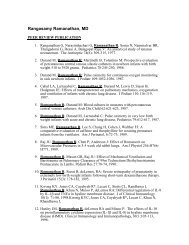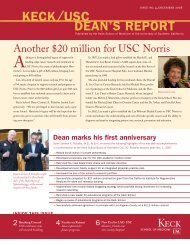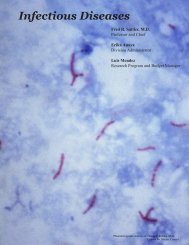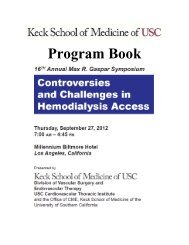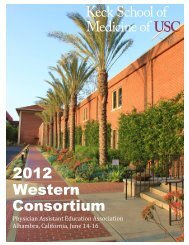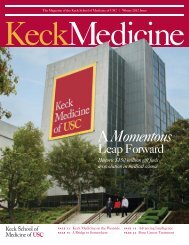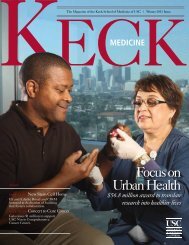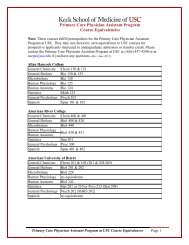Los Angeles County + University of Southern California
Los Angeles County + University of Southern California
Los Angeles County + University of Southern California
Create successful ePaper yourself
Turn your PDF publications into a flip-book with our unique Google optimized e-Paper software.
<strong>Los</strong> <strong>Angeles</strong> <strong>County</strong> + <strong>University</strong> <strong>of</strong> <strong>Southern</strong> <strong>California</strong>PSYCHIATRY RESIDENCY TRAINING PROGRAM2012 – 2013
LAC+USC Psychiatry Residency Training Program2012 – 2013
Isabel Lagomasino, MD MSHSResidency Program DirectorDarin Signorelli, MDAssociate Program DirectorWelcome to the <strong>University</strong> <strong>of</strong> <strong>Southern</strong> <strong>California</strong> (USC) Psychiatry Residency Training Program!We hope that during your visit with us and in the pages to follow, you sense our enthusiasm andpassion for training new generations <strong>of</strong> psychiatrists.Since its inception in 1943, the USC Psychiatry Residency Training Program has had exceptionalstrength in public sector and community psychiatry. In recent years, our Department hasexperienced tremendous growth and greatly expanded clinical, research, and teaching opportunitiesfor residents. Our goal is to help develop psychiatrists who provide compassionate, quality mentalhealth care for diverse persons; have the capacity to teach and to understand research; possessskills necessary for lifelong learning; and abide by the highest ethical and pr<strong>of</strong>essional standards.The training program <strong>of</strong>fers outstanding experience at two state <strong>of</strong> the art medical centers: the 1.1billion dollar <strong>Los</strong> <strong>Angeles</strong> <strong>County</strong> (LAC) + USC Medical Center and the private Keck Hospital <strong>of</strong> USC.Our clinical facilities provide unparalleled exposure to a rich and diverse clinical population, and ourfaculty takes great pride in their roles as educators and mentors. Most importantly, our residentsare dedicated students, clinicians, teachers, and scholars, who are critically involved in all aspects <strong>of</strong>our training program, and who are our greatest ambassadors.We look forward to sharing our program with you at this important and exciting time in your career.
Carlos N. Pato, MD PhDChair, Department <strong>of</strong> Psychiatry & Behavioral SciencesFranz Alexander Chair <strong>of</strong> PsychiatryThe Department <strong>of</strong> Psychiatry and Behavioral Sciences has expanded greatly in recent years and isestablishing a leading international presence in genomic psychiatry, translational research, and healthservices research. The foundation for this is a commitment to the best possible educational experience forour students and trainees and a dedication to the broad academic development <strong>of</strong> our trainees as teachersand researchers. As the major academic partner for <strong>Los</strong> <strong>Angeles</strong> <strong>County</strong>, USC plays a leading role in healthcare delivery and in graduate medical education for future psychiatrists. We are committed to developingand teaching the best health care practices <strong>of</strong> today, while also teaching skills that will enable an activeunderstanding and participation in the field <strong>of</strong> psychiatry that will be practiced 25 years from now. Webelieve that this is based in learning how to think critically and taking an active role in lifelong learning.
<strong>Los</strong> <strong>Angeles</strong> <strong>County</strong> (LAC) + <strong>University</strong> <strong>of</strong> <strong>Southern</strong> <strong>California</strong> (USC)PSYCHIATRY RESIDENCY PROGRAMOUR HISTORYIn 1878, the <strong>Los</strong> <strong>Angeles</strong> <strong>County</strong> (LAC) Board <strong>of</strong> Supervisors purchased 77acres and built a 100-bed hospital to serve the population <strong>of</strong> central andnortheast <strong>Los</strong> <strong>Angeles</strong> <strong>County</strong>. In 1884, the LAC Medical Center entered aunique partnership with the <strong>University</strong> <strong>of</strong> <strong>Southern</strong> <strong>California</strong> (USC)School <strong>of</strong> Medicine to provide both clinical services and graduatemedical education programs. The LAC+USC Medical Center quicklybecame the largest public health care facility and training center in<strong>Southern</strong> <strong>California</strong> and one <strong>of</strong> the largest in the nation. In 1913, theLAC+USC Medical Center began <strong>of</strong>fering psychiatric services, and in1943, the first psychiatry residents began their training.LAC+USC Medical CenterTHE USC HEALTH SCIENCES CAMPUSUSC is a large private university with two campuses located seven milesapart. The <strong>University</strong> Park campus is southwest <strong>of</strong> downtown <strong>Los</strong><strong>Angeles</strong>; the Health Sciences campus is two miles northeast <strong>of</strong>downtown <strong>Los</strong> <strong>Angeles</strong>. The Health Sciences Campus is home to the KeckSchool <strong>of</strong> Medicine, which has more than 700 students, and to theSchool <strong>of</strong> Pharmacy. Also on campus are three modern private hospitals:the Keck Hospital <strong>of</strong> USC, the Norris Cancer Hospital, and the Doheny EyeHospital. In 2003, the Zilkha Neurogenetic Institute Building opened topromote multidisciplinary research into the underlying causes <strong>of</strong>neurologic and psychiatric disorders.THE LAC+USC MEDICAL CENTERKeck School <strong>of</strong> MedicineThe LAC+USC Medical Center is a vast complex <strong>of</strong> county medicalfacilities located immediately across the street from the USC HealthSciences Campus. The large, iconic, art deco General Hospital that wasonce the cornerstone <strong>of</strong> clinical care and graduate medical educationwas replaced in November <strong>of</strong> 2008 with a brand new, state-<strong>of</strong>-the-art,600-bed Replacement Hospital.Zilkha Neurogenetic InstituteThe LAC+USC Medical Center serves a vital training mission, providingresidency education for over 800 physicians annually, including 60 inpsychiatry training programs. Residency training programs are sponsoredby the LAC+USC Medical Center, and attend teaching conferences androunds residency positions are funded by LAC. The size, abundance <strong>of</strong>rich clinical experiences, and expertise in medical education haveestablished the LAC+USC Medical Center as a dominant medicalinfluence in southern <strong>California</strong> for several decades.
THE DEPARTMENT OF PSYCHIATRY & BEHAVIORAL SCIENCESThe USC Keck School <strong>of</strong> Medicine Department <strong>of</strong> Psychiatry & Behavioral Sciences is committed to excellence inthree equally important areas: clinical care, education, and research. We are proud <strong>of</strong> a long record <strong>of</strong> clinicalservice to county residents, particularly in public sector systems <strong>of</strong> care. We <strong>of</strong>fer ACGME-accredited trainingprograms in General, Child & Adolescent, Forensic and Psychosomatic Psychiatry. These programs provideexcellent graduate educational experiences by combining the rich clinical resources <strong>of</strong> a large, public medicalcenter and private clinical facilities with the academic excellence <strong>of</strong> a vibrant medical school department. Ourdiverse research programs have experienced unprecedented growth, particularly in the areas <strong>of</strong> psychiatricgenetics, clinical treatments, and health services research.Clinical Sciences CenterDepartment OfficesOutpatient Department BuildingResidency OfficesOUR FACILITIESThe USC Department <strong>of</strong> Psychiatry & Behavioral Sciences benefits from access to diverse locations for optimizingclinical, educational, and research activities. In 2007, a new department headquarters was opened on the secondfloor <strong>of</strong> the Clinical Sciences Center on Alcazar Street. This remodeled space houses core administrative andresearch <strong>of</strong>fices, is home to the Chair <strong>of</strong> the department, and is utilized for resident lectures. The ResidencyTraining Program <strong>of</strong>fices are located in the Outpatient Department Building closer to the General Hospital. Aresident lounge for both work related activities and relaxation/social time has workstations with computers, a faxmachine/printer/scanner, a refrigerator and microwave, and a casual seating area.Most clinical psychiatric services are based at the new LAC+USC General Hospital, which houses the PsychiatricEmergency Service, Consultation-Liaison Service, and Behavioral Medicine Unit; an adjacent Clinic Tower housesthe Adult Outpatient Clinic. On the USC Health Sciences Campus, residents provide inpatient, consultation, andambulatory care services at Keck Hospital <strong>of</strong> USC and the Healthcare Consultation Center. Additional adult andadolescent inpatient services are provided at the Augustus Hawkins Mental Health Center. Rotations at USCaffiliatedVA facilities in downtown and West <strong>Los</strong> <strong>Angeles</strong> allow for specialized training in addiction and geriatricpsychiatry. Finally, a partnership with the LAC Department <strong>of</strong> Mental Health provides unique opportunities forunderstanding the delivery <strong>of</strong> mental health care to underserved communities.LAC+USC Medical Center
THE GENERAL PSYCHIATRY RESIDENCY TRAINING PROGRAMThe goal <strong>of</strong> the USC Residency Training Program is to train psychiatristswho are caring, skilled clinicians; are confident in their abilities to teachand to understand research; possess the skills necessary for lifelonglearning; and abide by the highest ethical and pr<strong>of</strong>essional standards.Graduates should be well prepared to pursue career opportunities indiverse clinical, academic, and research areas.Psychiatry & Behavioral SciencesClinical Sciences CenterDuring their training, our residents learn through a variety <strong>of</strong> clinical,didactic, and mentored experiences. Residents provide direct clinicalcare on all services for persons from all age and ethnic groups who aresuffering from a wide variety <strong>of</strong> psychiatric disorders. Our faculty hasexpertise in all major psychiatric disorders and treatment modalities,thus providing residents with opportunities to learn about diverseclinical populations, theoretical paradigms, and therapeuticinterventions. No paradigm is paramount; rather, residents areencouraged to apply diverse biological, psychological, and socialframeworks in their understanding and treatment <strong>of</strong> psychiatric illness.The residency experience is enriched by didactic instruction inunderstanding and applying medical literature; opportunities toparticipate in research; and mentored experiences in teaching morejunior residents and medical students.The leadership <strong>of</strong> the USC Psychiatry Residency Training Programincludes the Residency Program Director, Dr. Isabel Lagomasino, aswell as an Associate Program Director: Dr. Darin Signorelli, who is alsoDirector <strong>of</strong> Medical Student Education in Psychiatry. Both areattending physicians in the ambulatory services providing supervisionand teaching.Outpatient Department BuildingResident LoungeResident LoungeThe Department <strong>of</strong> Psychiatry & Behavioral Sciences <strong>of</strong>fers a four-yeartraining program in general psychiatry that includes an internship yearfor graduating medical students who apply through the NationalResidents Matching Program. Almost all <strong>of</strong> our 45 general psychiatryresidents enter in this program. In the event <strong>of</strong> an opening, positionsare <strong>of</strong>fered to physicians who have completed an ACGME-accreditedinternship year elsewhere (i.e., Pediatrics, Internal Medicine, FamilyMedicine, or Psychiatry) and are at an advanced level <strong>of</strong> training.
ROTATION SCHEDULESOur department is dedicated to a dynamic approach to education. The training experience for each resident isdesigned to meet the ACGME specialty training requirements for psychiatry, while allowing residents to tailortheir educational experience. Residents have 7 months <strong>of</strong> elective time in the PGY4 year. They may also choseto complete rotations not as full-time, monthly, blocks, but rather as less than full-time experiences over agreater number <strong>of</strong> months, thus combining them with other part-time experiences on other services andallowing for longitudinal treatment experiences.The following table depicts the core rotational content <strong>of</strong> the four-year program. The first or internship yearincludes 4 blocks <strong>of</strong> Internal Medicine or Pediatrics (or a mix there<strong>of</strong>), 2 blocks <strong>of</strong> Neurology, 6 blocks <strong>of</strong>Psychiatry (3 blocks <strong>of</strong> Adult Inpatient Psychiatry and 3 blocks <strong>of</strong> Emergency Psychiatry) and an introduction toQuality Improvement/Research block. The medicine and psychiatric rotations alternate every two blocks toprovide a diverse educational experience. Interns attend core lectures or seminars in psychiatry throughoutthe year. They also attend teaching conferences and rounds on Internal Medicine, Pediatrics, and Neurologywhen assigned to those services.In the event that a resident enters the program after having completed an ACGME-accredited internship yearelsewhere (i.e., Pediatrics, Internal Medicine, Family Medicine, or Psychiatry), the rotation schedule is similarto that <strong>of</strong> the four-year program but is tailored to ensure that all ACGME specialty requirements are met.CLINICAL ROTATIONSYear 14 Blocks 2 Blocks 3 Blocks 3 Blocks 1 BlockMedicine/PediatricsNeurologyEmergencyPsychiatryInpatientPsychiatryQI/ResearchYear 24 Months 1 Mo 1 Mo 1 Mo 1 Mo 4 MonthsInpatient PsychiatryKeckHospitalAdolescentInpatientPsychVAGeriatricPsychVAAddictionPsychConsultation-LiaisonPsychiatry12 MonthsYear 3LAC+USC Adult Outpatient Clinic (90%)USC Private Practice Outpatient Clinic (10%)Year 41 Mo 1 Mo 1 Mo 2 Mo 7 MonthsCommunityPsychChildCrisisConsult-LiaisonPsychKeck HospitalOngoing Outpatient Clinic (10%)Chief Residency (20%)Electives
CLINICAL SERVICE DESCRIPTIONSHawkins Mental Health CenterKeck Hospital <strong>of</strong> USCInpatient PsychiatryInpatient Services are based at a newly renovated 62-bedfacility at the Augustus Hawkins Mental Health Center, which islocated approximately 18 miles south <strong>of</strong> the LAC+USC MedicalCenter and houses 3 adult teaching wards (29 beds) and 1adolescent ward (10 beds). Residents assess and treatapproximately 2-3 new adult patients per week while carrying ausual caseload <strong>of</strong> 5-7 patients. Faculty psychiatrists superviseresidents in their care <strong>of</strong> all new and ongoing cases. The adultinpatient services emphasize short term, acute psychiatric carewith the goal <strong>of</strong> discharge and continued treatment in lessrestrictive outpatient settings. This rotation provides anintensive experience in diagnostic evaluation and treatment aswell as introductions to major psychopathology and to the legalregulation <strong>of</strong> inpatient psychiatric practice (e.g. hospital- andcourt-based legal hearings). In addition to resident and facultyphysicians, the inpatient staff includes psychologists, clinicalpharmacists, psychiatric social workers, occupational andrecreational therapists, nursing personnel, and medicalcaseworkers. Residents teach and supervise medical students,and senior residents supervise junior residents. Residents alsohave a night float experience in which they work with on-sitefaculty members admitting patients during the night.An additional adult inpatient service rotation on the KeckHospital <strong>of</strong> USC 10-bed unit provides residents with exposure toa private hospital setting and to patients from differentsocioeconomic backgrounds. This rotation also includes trainingin electroconvulsive therapy.Emergency PsychiatryThe Psychiatric Emergency Service is located on the main floor <strong>of</strong>the General Hospital. Faculty psychiatrists see patients withresidents and discuss diagnoses and treatment plans. Patientseither walk in or are brought in by ambulance, police, socialagencies, or concerned families and friends. Clinical issues arefrequently related to suicidal potential, dangerousness, and thecapacity to care for oneself. Residents become skilled inemergency evaluations, acute treatment strategies, crisisintervention, and community resource referrals. In addition toresident and faculty physicians, the emergency room staffincludes psychologists, psychiatric social workers, nurses, andmedical caseworkers. Residents also have an opportunity toevaluate and treat children and adolescents who present foremergency care.
Consultation PsychiatryThe Psychiatry Consultation-Liaison Service is primarily located inthe General Hospital and includes a 24-bed Behavioral Medicineward that is co-managed by the Psychiatry and Internal MedicineDepartments. Residents evaluate new consult patients whilemonitoring the care <strong>of</strong> ongoing cases. Faculty psychiatristsprovide supervision for all new and ongoing cases. This clinicalservice provides comprehensive training in the principles <strong>of</strong>consultation-liaison psychiatry and crisis intervention. Residentsbecome pr<strong>of</strong>icient in the evaluation and treatment <strong>of</strong> psychiatricsymptoms among medically and surgically ill patients. Residentsalso rotate through the USC <strong>University</strong> Hospital Consultation-Liaison Service, where they have opportunities to evaluate andtreat patients on specialized medical-surgical services, includingthe transplant, bariatric, and oncology services. Residents teachand supervise medical students on both services. A specializedGeriatric Psychiatry rotation is <strong>of</strong>fered at the USC-affiliated West<strong>Los</strong> <strong>Angeles</strong> VA Medical Center, approximately 15 miles from theLAC+USC Medical Center. Residents consult on older medical andsurgical inpatients as well as nursing home residents and receivesupervision from faculty specialized in geropsychiatry.Ambulatory PsychiatryAmbulatory psychiatric services are primarily provided in theAdult Outpatient Clinic that is located in the Clinic Tower adjacentto the General Hospital. Services are available for patients <strong>of</strong> allages, including children, adolescents, and adults. An additionaloutpatient experience is <strong>of</strong>fered in the Healthcare ConsultationCenter on the USC Health Sciences Campus. Clinical rotations inambulatory psychiatry provide intensive training in both longtermand short-term treatments for diverse psychiatric disorders.Residents typically evaluate 1-2 new patients weekly. Ongoingcaseloads for mostly medication management services includeapproximately 75 patients; residents also carry 4-6 ongoingpsychotherapy cases. Residents are assigned faculty supervisorsfor each treatment modality (psychopharmacology, supportivepsychotherapy, psychodynamic psychotherapy, cognitivebehavioralpsychotherapy, and interpersonal psychotherapy);additional consultation is always available. A specialized AddictionPsychiatry rotation is <strong>of</strong>fered at the USC-affiliated VA AmbulatoryCare Center in downtown <strong>Los</strong> <strong>Angeles</strong>, less than 2 miles from theLAC+USC Medical Center. Although training and didacticinstruction in addiction psychiatry is provided across all services,this rotation allows residents to focus on the outpatient care <strong>of</strong>patients with alcohol and drugLAC+USC General HospitalWest <strong>Los</strong> <strong>Angeles</strong> VA Healthcare CenterClinic TowerHealthcare Consultation Center II
dependency. Treatment modalities employed include methadonemaintenance programs, buprenorphine treatment, pharmacotherapy todecrease withdrawal symptoms, and 12-step programs (e.g., AlcoholicsAnonymous).<strong>Los</strong> <strong>Angeles</strong> VA Ambulatory Care CenterPsychopharmacology Seminar at CSCMental Health SystemsCommunity psychiatry is a core <strong>of</strong> the training program. A specializedexperience in administrative psychiatry and public policy is <strong>of</strong>fered bythe LAC Department <strong>of</strong> Mental Health, the largest county mental healthsystems in the country. By visiting many different types <strong>of</strong> facilities andthrough meetings with clinical program directors, residents gain anappreciation for the administrative and organizational tasks associatedwith the operation and financing <strong>of</strong> a mental health system. Residentsalso gain experience in consulting to community agencies and leadinginterdisciplinary teams.Elective TimeDuring elective time, residents may select a variety <strong>of</strong> clinical or researchexperiences based upon their individual needs and interests. Residentsfrequently decide to rotate on specific clinical services or to pursue newexperiences in addiction, forensics, women’s mental health, specificpsychotherapies, or research, and may also design new electiveexperiences tailored to their interests.CURRICULUMCore CurriculumAll residents attend a half-day <strong>of</strong> core lectures weekly. The core curriculumis separated by residency class year, although fourth-year residents areencouraged to provide several lectures to the second- and third-yearresidents. Residents have protected time away from clinical services fortheir core lectures. The curriculum for each year is designed to augmentthe training and teaching provided on individual clinical services and toensure comprehensive instruction in psychopathology, evaluation anddiagnosis, neuroscience and genetics, psychopharmacology and diversepsychotherapies, evidence-based medicine, sociocultural aspects <strong>of</strong>mental illness, and ethical and legal concerns. The program providesresidents with required textbooks and facilitates online access to othereducational materials.Service-Specific CurriculaEach major clinical service, including adult inpatient services, psychiatricemergency services, consultation-liaison services, and ambulatoryservices, sponsors a separate, service-specific curriculum. These curriculaoccur on-site and focus on content specific to the given service. In general,each service includes case conferences, journal club meetings, and didacticlectures on clinical topics.
Department Grand RoundsThe Psychiatry Grand Rounds is held weekly for the entiredepartment. Twice per month, Grand Rounds features local andvisiting pr<strong>of</strong>essors from all areas <strong>of</strong> psychiatry presenting theirresearch and selected topics <strong>of</strong> interest. Once per month, GrandRounds consists <strong>of</strong> a Clinical Case Conference, during which aresident presents an interesting case with a faculty discussant.During the remaining week per month, residents meet as agroup with the chief residents while faculty attend a businessmeeting focusing on administrative, medical center, and countyissues affecting the department and training program.Grand Rounds at the ZilkhaBoard Review CourseA Board review course is <strong>of</strong>fered in July and August <strong>of</strong> each yearin preparation for the Psychiatry Resident In-TrainingExamination (PRITE) each October and for the American Board<strong>of</strong> Psychiatry and Neurology (ABPN) examination. This courseuses a combination <strong>of</strong> textbook and question learning and is ledby residents with faculty participation and consultation. Ourgoal is for all graduates to become board certified.Third-Year Poster SessionJournal Clubs / ScholarshipEvidence-based medicine/research methods are taught injournal clubs and as separate research courses in each year.Third-year residents are required to complete a small,independent research project. Projects are broad in range—recently, they have mostly consisted <strong>of</strong> literature reviews, casereports or case series, and chart reviews related to improvingquality <strong>of</strong> care on our ambulatory services. Recent researchtopics have included: the use <strong>of</strong> ketamine for treatmentresistantdepression; the role <strong>of</strong> hormones in the treatment <strong>of</strong>schizophrenia; the impact <strong>of</strong> bullying on depressive and anxietydisorders among children and adolescents; treatment <strong>of</strong> deliriumin children; stress and resilience during residency training; thehistory <strong>of</strong> restraints in psychiatric practice; and the relationshipbetween global economic indicators and mental health care.These projects were presented in poster sessions to alldepartment members. Some residents chose to submit abstracts<strong>of</strong> their work to the Annual Meeting <strong>of</strong> the American PsychiatricAssociation or to write a manuscript; residents have presentedtheir work as posters or in oral presentations. Faculty advisorsare readily available to assist residents with these projects. Inaddition, the Department provides meeting registration andtravel funds for residents who present posters or papers.
CLASS COHESIONDespite the fact that each class typically has twelve residents, there is remarkable cohesion among the residents.Like an extended family, residents are quick to volunteer to help a colleague who is ill or in trouble, and they covereach other’s service in times <strong>of</strong> absence. Close-knit friendships form, and it is not uncommon to see residentseating lunch together in the hospital’s Doctors’ Dining Room or heading out for an after-hours social gathering.SALARIES AND BENEFITSResidents are employees <strong>of</strong> the <strong>County</strong> <strong>of</strong> <strong>Los</strong> <strong>Angeles</strong>. Resident salaries are determined in negotiations betweentheir legal bargaining unit, the Joint Council <strong>of</strong> Interns and Residents (JCIR), and the LAC Department <strong>of</strong> HealthServices.Effective 7/01/2011PGY1 $ 43,957PGY2 $ 49,177PGY3 $ 53,284PGY4 $ 57,419Total $203,837The sum <strong>of</strong> salaries for the four years is highly competitive with that <strong>of</strong> other programs. External moonlighting - <strong>of</strong>fcampus in community settings - is permitted on a selected basis. To moonlight, residents must be US citizens orhave permanent visas; have <strong>California</strong> medical licenses; demonstrate excellent clinical and academic performance;have completed four months <strong>of</strong> outpatient work; and receive approval from the residency program director.OTHER BENEFITSBonusMeals$2,000 for interns progressing to second residency year in a <strong>County</strong> facility$10 per meal, $28 per day at the LAC+USC Medical Center; meals are reimbursedduring <strong>of</strong>f-campus rotationsParkingAvailable at no cost at the LAC+USC Medical CenterWhite CoatsProvidedVacationResidents earn 2 working days per month (i.e., 24 days per year)Sick Leave8 days per year, <strong>of</strong> which 3 may be used for personal leaveMalpractice Coverage Provided (<strong>Los</strong> <strong>Angeles</strong> <strong>County</strong> self-insures)Maternity LeaveAvailable: most residents use sick leave, vacation time, and limited unpaid leaveParental Leave Available as required by the Family and Medical Leave Act <strong>of</strong> 1993Medical/Dental Benefits Choice <strong>of</strong> several <strong>of</strong>fered plans; family coverage available at additional costLife Insurance$2,000 term policy is provided; additional insurance may be purchasedWEBSITESDepartment <strong>of</strong> Psychiatrywww.usc.edu/schools/medicine/departments/psychiatry_behavioralsciencesOffice <strong>of</strong> Graduate Medical Educationkeck.usc.edu/About/Administrative_Offices/Office_<strong>of</strong>_Graduate_Medical_EducationLAC+USC Healthcare Networkwww.lacusc.org
LIFE IN LOS ANGELESFew areas in the world rival southern <strong>California</strong>. The beautiful weather, cultural diversity, expansivebeaches, and lush mountains make <strong>Los</strong> <strong>Angeles</strong> one <strong>of</strong> the most desirable cities in which to live. In additionto Hollywood and the motion picture industry, <strong>Los</strong> <strong>Angeles</strong> boasts excellent museums and is home toworld-class restaurants, performing arts, and sporting events.The <strong>Los</strong> <strong>Angeles</strong> climate is ideal, with over 300 days <strong>of</strong> sunshine per year. Temperatures are generally warmwith low humidity during the day and are cooler at night. The beaches--from Malibu to Santa Monica toVenice to Long Beach--are all close for swimming, surfing, and sailing. The beauties <strong>of</strong> the desert and PalmSprings are only two hours away, and Yosemite National Park is about 5 hours away. In the winter, a twohourtrip will provide access to skiing in the San Bernardino Mountains. The Mammoth mountain ski areasare about 6 hours away.Cultural and entertainment events include world-class theaters and museums. Dodger stadium is visiblefrom the Medical Center, and it is possible to drive to the Rose Bowl in about 15 minutes or to Disneylandin about 40 minutes. With ten million people in this geographically large county (about a third <strong>of</strong> thepeople in <strong>California</strong>), there are all types <strong>of</strong> vocational and educational opportunities for residents’ families.SPECIAL THANKSTo Dr. Charles Patterson, former director <strong>of</strong> our program, Jennifer Green, and Penny Pourat for their invaluableassistance in developing this brochure.
KECKSCHOOL OF MEDICINE OF USCDepartment <strong>of</strong> Psychiatry & Behavioral Sciences2010 Zonal AvenueOPD Building 1P10<strong>Los</strong> <strong>Angeles</strong>, CA 90033Phone: 323.226.5555Email: psychres@usc.edu


